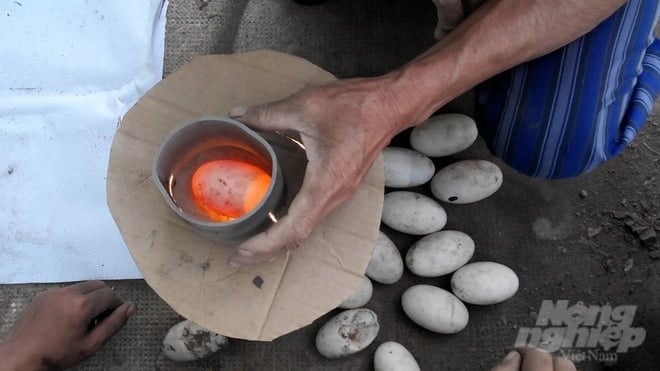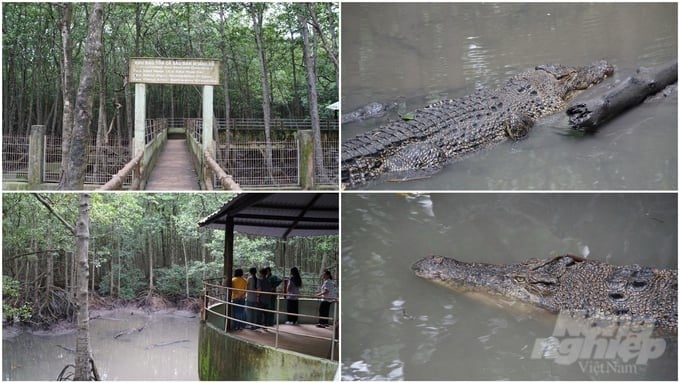November 21, 2025 | 08:26 GMT +7
November 21, 2025 | 08:26 GMT +7
Hotline: 0913.378.918
November 21, 2025 | 08:26 GMT +7
Hotline: 0913.378.918

Candling crocodile eggs before hatching. Photo: Tran Phi.
The Siamese crocodile (Crocodylus siamensis) is a medium-sized freshwater crocodile native to Indonesia (Borneo and possibly Java), Brunei, East Malaysia, Laos, Cambodia, Myanmar, Thailand, and Vietnam. The species is critically endangered and has already extirpated in many regions.
At Dam Sen Bird Garden, hundreds of freshwater crocodiles (also known as Siamese crocodiles) are being raised and cared for. Every year, Dam Sen also welcomes more than 600 baby crocodile individuals born through the artificial hatching method. This is a great success in the work of breeding and preserving this species.
Mr. Nguyen Quoc Cuong, Manager of Dam Sen Cultural Park, said that the freshwater crocodile conservation program here has a large participation of students.
“Participating in the program, students learn about the morphology, reproductive characteristics, habitat, and practical care of crocodiles; directly observe the egg-laying nest; and learn how to collect eggs so as not to affect the development of the embryo," Mr. Cuong shared.
After that, each group of tourists will bring eggs to the artificial incubation area to learn about the incubation process and nest-making. They are instructed on hatching conditions and controlling temperature, humidity, and light.
Finally, as for "delivering" and taking care of the baby crocodiles, students will wear headphones and put them down in the hatching nest to hear the sounds of the baby crocodiles asking to be born, pick up the eggs, and break the eggshells to help the baby crocodiles crawl out.
Thanks to participating in the Convention on International Trade in Endangered Species of Wild Fauna and Flora (CITES) since 1993, large-scale crocodile farming in Vietnam has become increasingly popular in recent years. Especially Hoa Ca Crocodile Company Limited (Ho Chi Minh City), the pioneer in building a crocodile farming village with the new name of Saigon Crocodile Craft Village under Xuan Loc Agricultural Cooperative, District 12, Ho Chi Minh City.

Crocodiles are preserved and exploited for experiential tourism in Can Gio district, Ho Chi Minh City. Photo: Le Binh.
Mr. Huynh Chau Tien, Head of the Livestock Department of Saigon Crocodile Craft Village, said that “Crocodiles' egg-laying season is from February to June every year. This year, the weather is erratic and the temperature is high, so the hatching rate is quite low, not reaching 50%.” According to Mr. Tien, commercial crocodiles are raised separately in large iron mesh cages, including a sunbathing yard.
Mr. Le Dac Thanh, Deputy Head of Crocodile Care, Saigon Crocodile Craft Village, said that crocodiles here are fed from a young age, so they do not have high hunting habits. Only when the breeding season comes will crocodiles have the nature of keeping their children, so they will be more ferocious than usual.
“Most crocodiles lay eggs at night, so collecting eggs at night is more dangerous. Crocodiles that still have silk will hold eggs less than older ones," Mr. Thanh shared.
Mr. Ton That Hung, Director of Saigon Crocodile Craft Village, said that this farm was established in 1987, and then in 2000 it was appraised by international experts. In the concept of sustainable wildlife exploitation, for crocodiles, it means that only the second generation can be sold. Whereas, if the farm sells crocodiles caught in nature, the license will be immediately revoked.

A variety of dishes can be prepared from crocodile meat. Photo: Tran Phi.
Not only does it create commercial value for this type of animal with fashion products made from crocodile skin, teeth, and claws, but Saigon Crocodile Craft Village also researches and includes 25 dishes made from crocodile meat, such as spring roll, crocodile salad, steamed crocodile meat with ginger, curry, etc. in processed, packaged, and frozen forms.
According to Mr. Nguyen Quang Hoang, Deputy Head of the Wildlife Rescue Station-Ho Chi Minh City Forest Protection Sub-Department, despite difficulties, processing and consuming products from crocodiles is still an escape for this industry.
“To maintain and develop the crocodile industry, farms and processing facilities need to find ways to change and raise consumers’ awareness about crocodile products. It is necessary to build an effective marketing strategy to promote and access the right customer objects. At the same time, there is a need for improving product quality. In particular, finding new export markets and expanding international marketing networks is very important to increase revenue and develop in the long term."
Translated by Huyen Vu Thu

(VAN) This is the study conducted by IRRI and Can Tho University on the rice straw value chain in Mekong Delta showing an economic potential of more than 6.6 trillion VND/year.

(VAN) By participating in cooperative economics, many farmers in Tay Ninh have overcome hardship, mastered clean dragon fruit cultivation techniques.

(VAN) The crossbreeding program in the former Binh Dinh province (now part of Gia Lai) has shown signs of decline, and urgent measures are needed to revive it and sustain past achievements.

(VAN) The agricultural sector agreed on a roadmap to pilot the MRV protocol and expand low-emission rice production from the 2025-2026 winter-spring crop.

(VAN) Agricultural extension officers in Quang Ninh do more than transmit knowledge; they have become a steadfast support system for farmers on the path to sustainable agricultural development.

(VAN) The development of a high-quality beef cattle herd has brought major benefits to livestock farmers, creating jobs and enabling better use of agricultural by-products.

(VAN) In the eastern region of Gia Lai, crossbred cattle now account for 93%, forming a high-quality beef herd and establishing a recognized brand, the result of 35 years of persistent effort.